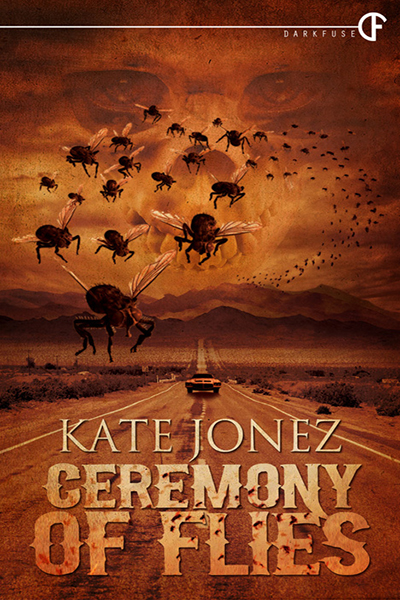
Welcome to this week’s installment of The Scariest Part, a recurring feature in which authors, comic book writers, filmmakers, and game creators tell us what scares them in their latest works of horror, dark fantasy, dark science fiction, and suspense. (If you’d like to be featured on The Scariest Part, check out the guidelines here.)
My guest is Matthew Johnson, whose latest book is the short story collection Irregular Verbs and Other Stories. Here’s the publisher’s description:
keluarga: to move to a new village
lunak: to search for something without finding it
mencintai: to love for the last time
Meet a guilt-ridden nurse who atones for her sins by joining her zombified patients in exile; a lone soldier standing guard on a desolate Arctic island against an invasion that may be all in his mind; a folksinger who tries to unionize Hell; and a private eye who only takes your case after you die. Visit a resettlement centre for refugees from ancient Rome; a lost country recreated by its last citizen on the Internet; and a restaurant where the owner’s ghost lingers for one final party. Discover the inflationary effects of a dragon’s hoard, the secret connection between Mark Twain and Frankenstein, and the magic power of blackberry jam — all in this debut collection of strange, funny, and bittersweet tales.
And now, let’s hear what the scariest part was for Matthew Johnson:
When I first thought of doing a short story collection with CZP it seemed like a bit of an odd fit. After all, ChiZine is known mostly for dark fiction and horror, and my work tends more towards science fiction and fantasy; when I write horror it’s usually by accident — something that seems straightforward or even funny to me but which turns out to terrify other people. But the fact that the collection exists at all is because of a time when I scared myself: for me, in fact, the scariest part of Irregular Verbs was wondering whether I would ever write it.
Let me explain. There was a long period when, as a high school teacher with no kids, I had oodles of time to write. From September to June I was a teacher, not a writer, but for two months of the year I wrote full-time, eight hours or more a day at the keyboard. In just over five years of that schedule I wrote a lot of stuff, and some of it got a bit of attention: stories that got good reviews, or were included in Best Of collections, and even got translated into a few other languages.
Then, in the space of a few years, I left teaching and started a new job (the one I still have now.) Now I was working twelve months a year, facing a fearsome learning curve and — most importantly — doing work that I couldn’t compartmentalize off from my writing: designing lessons, creating educational computer games, and writing blogs, things that used the same part of my brain as writing fiction did.
And then my son Leo was born.
Don’t get me wrong: I love all my children more dearly than life itself. But Leo was not an easy baby. For the first five months of his life he was a colicky monster that could only be soothed by constant rocking and singing. For a long time, writing was completely off the table: I spent hours every night with Leo in my arms, sitting in an old rocking chair that had belonged to my wife’s grandfather. (He had been famous for his ability to calm babies, though by the time I knew him he only ever shared the chair with George, a reformed barn cat with demon eyes and needle-sharp claws.) What little energy I had left at the end of these nights was completely taken up by my day job, and as the months crawled by I began to wonder if I would ever write anything again.
Then, one night, something appeared in my mind that terrified me. The day before I had read Leo “The Tale of Mrs. Tiggy Winkle,” and now I had a thought that wouldn’t let me go: what if all of those portal fantasies, all of those stories about boys and girls being taken off for adventures in strange worlds — what if those stories were traps? What if they were lures, designed to trick children into following elves and talking animals to a very different, much darker destiny? Now that I had a child of my own to protect, held tight in my arms, the idea scared me so much it wouldn’t let go.
I spent the night working out who was luring these children, why they were doing it and where they were taking them. By morning I had the outlines of a story, “Beyond the Fields You Know,” that begins like this:
The boy was called Calx. He did not remember his real name.
He was not sure how long he had been at the House. He did not know how long it had been since he had seen his parents; their names, too were long gone, scraped away by toil and hunger. But he remembered their faces, and his bedroom with the biplane wallpaper and the Elmo sheets — and he remembered the Gnome with the Silver Key.
In the end it took me about six months to write it, stealing time while on planes and in hotels during business trips, but that didn’t matter: what mattered was that I was still writing, was still a writer. That gave me the will to put together a collection of my work and shop it around, and finally find a home for it at ChiZine.
I still write a lot more slowly than I used to, and — like most writers — I’m still working to find time and energy to write. (I am, in fact, writing this in an airport.) But ever since that night, I don’t doubt anymore that I will keep writing, and some of my favourite stories in Irregular Verbs are the ones that I’ve written since my kids were born. Because of the way that story scared me, the way it forced me to write it and wouldn’t let me go, I’m not scared anymore.
Matthew Johnson: Website / Twitter
Irregular Verbs and Other Stories: Amazon / Barnes and Noble / Powells / ChiZine / Goodreads
Matthew Johnson has published stories in places such as Asimov’s Science Fiction, The Magazine of Fantasy & Science Fiction and Strange Horizons and has published one novel, Fall From Earth, from Bundoran Press. His work has been collected in several Year’s Best anthologies and has been translated into Danish, Czech and Russian. While not writing or engaged in full-contact parenting he works as the Director of Education for MediaSmarts, an internationally known non-profit source of digital and media literacy resources where he writes lessons and blogs, designs award-winning educational games and occasionally does pirate voices in both English and French.
 A Handbook of American Prayer by Lucius Shepard
A Handbook of American Prayer by Lucius Shepard



